We have always been focused on building a unique and fulfilling workplace at Buffer, where we value the well-being of our customers and team, and prioritize our individual and collective growth. While diversity, equity, and inclusion (DEI) have always been a big part of our culture, it is more important than ever for organizations to bring a business approach to DEI efforts in order to foster a culture where all team members feel welcomed and valued, and everyone has an equal opportunity for success. That’s why we completed our first DEI report, compiling data collected from an internal survey and audit to give us formal insight into setting goals, measuring success, and helping to hold us accountable for continually improving our culture.
Here’s how we collected our data, used that data to identify our top three focus areas, then formulated a roadmap to support our goals, ensuring DEI is a foundational component of our company strategy.
How we went about collecting DEI data
We had not previously performed an internal audit of our DEI data, so decided to establish baseline metrics to help us set informed goals moving forward, and allow us to measure success over time. To help us, I chose to use Pluto, a diversity, equity and inclusion data platform that supports companies in their DEI efforts by providing a secure space for employees to share their identity and experiences. Pluto offers comprehensive DEI metrics, advanced intersectional analytics, proprietary privacy measures, and anonymous two-way messaging, all which help generate actionable insights to help build a stronger culture and drive continuous improvement.

We had 66 percent of our 88 person team complete Pluto’s 20-minute anonymous survey at the end of 2021, and we also audited our attrition, promotions, and applicant data in relation to DEI. This helped us get a well rounded look at where we are at currently, so we can set goals for the future.
Results from Buffer’s 2022 DEI report
We have a lot of reasons to celebrate what we have accomplished so far!
- Teammates feel our culture generally supports them bringing their authentic self to work.
- Most teammates feel that they belong and are respected.
- Nearly everyone feels that our benefits are inclusive, they love the flexible work, and feel the pay is fair.
- We have great LGBTQ representation.
- Our applicant pool is quite diverse overall.
Of course, we also have room for improvement, and there are some areas that we need to focus on to create a more inclusive and equitable experience for all team members. Here’s more on each of those:
Diversity
While our applicant pool is diverse, our team representation numbers do not maintain similar percentages, and our Black and Latine representation is lower than where we want it to be.
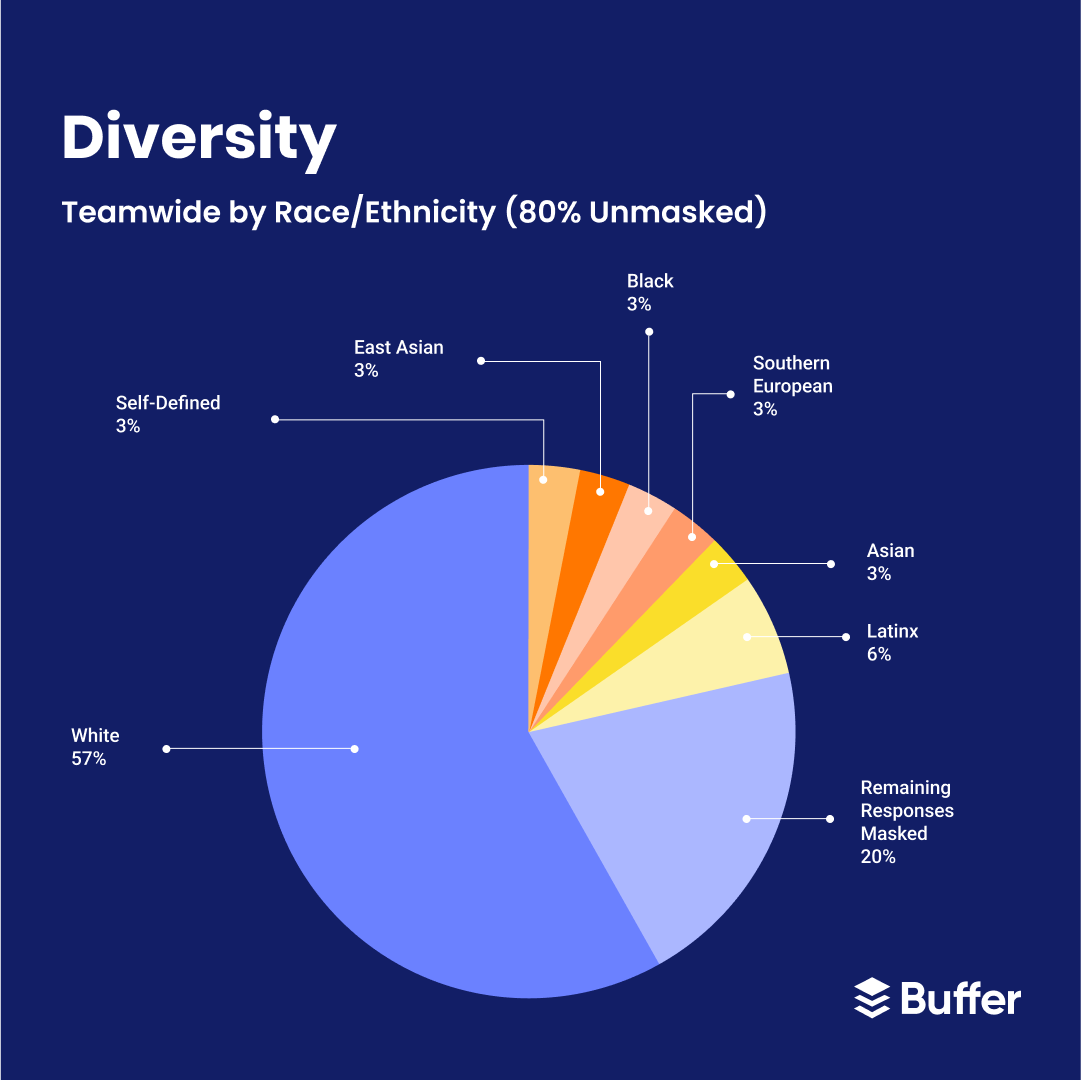
Inclusion
We found that about a third of the team doesn't feel comfortable voicing contrary ideas or discussing DEI related topics. This impacts our teams psychological safety, and can add to challenges around artificial harmony.
Most people who hide a part of their identity at work are hiding religious beliefs, disability, mental health, or political beliefs, and do so because they fear how they might be perceived, or that it will negatively impact them.
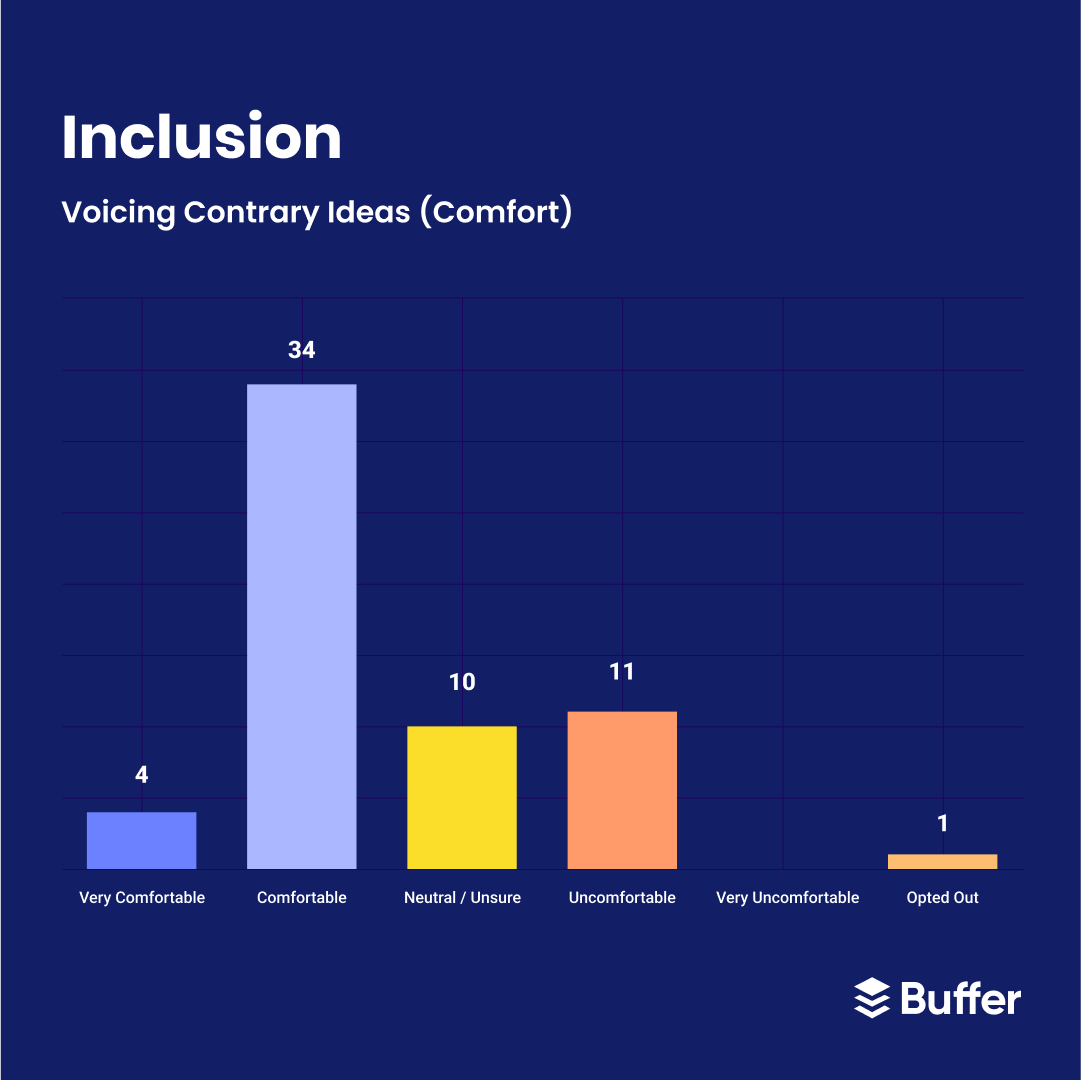
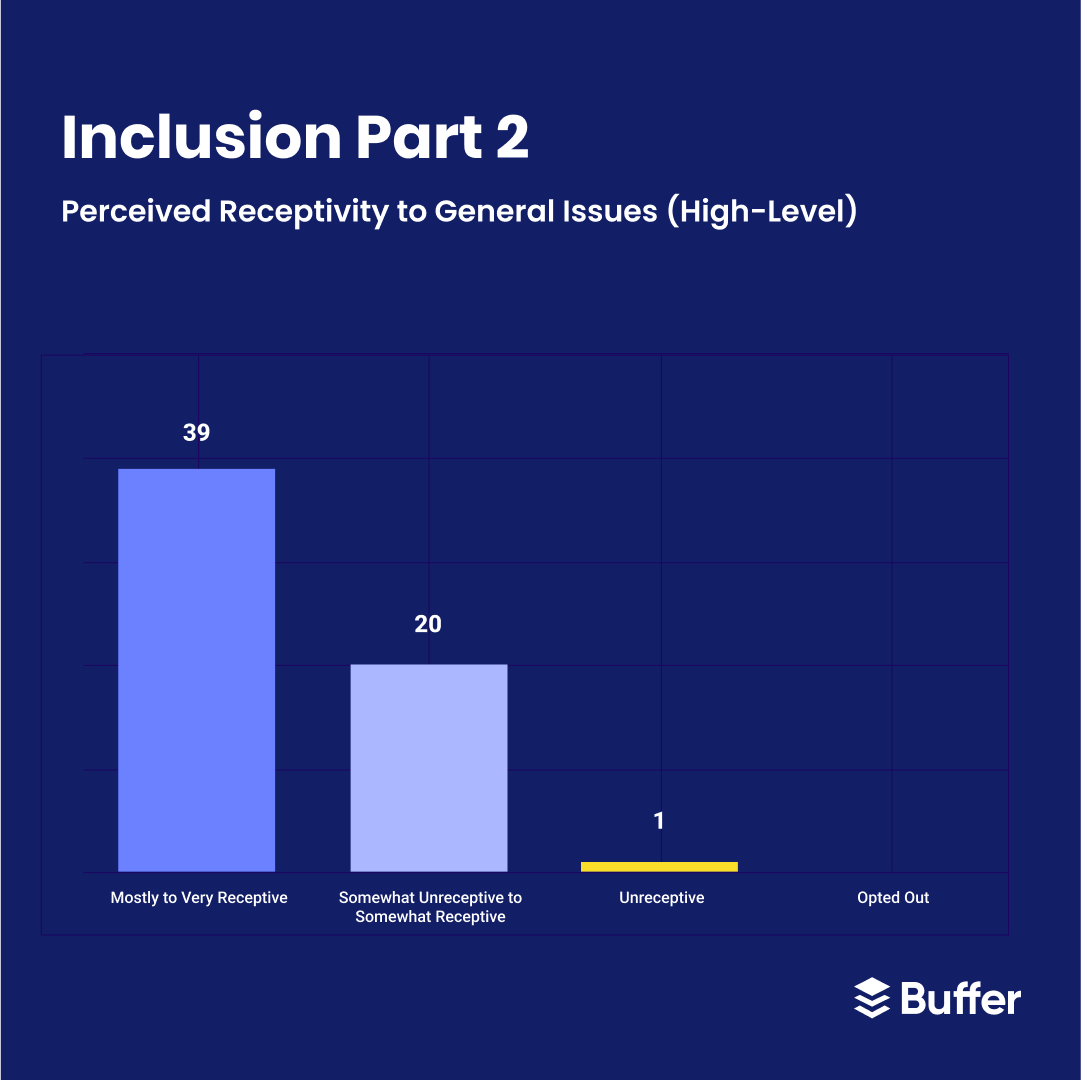
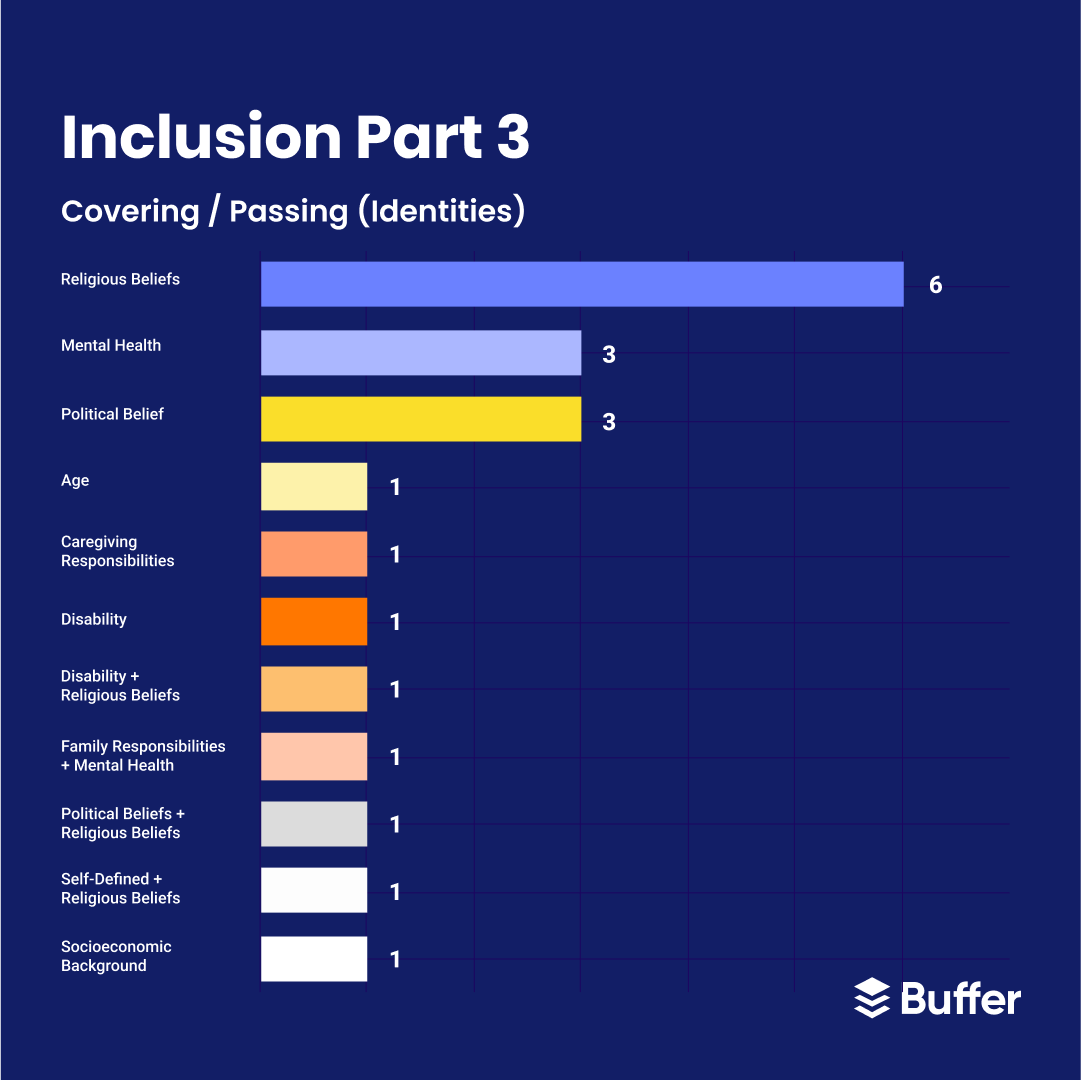
Equity
Some people are unaware of Buffer’s incident reporting policies, unsure how to report incidents, or are uncomfortable reporting. There are also team members who don’t know how to request necessary accommodations.
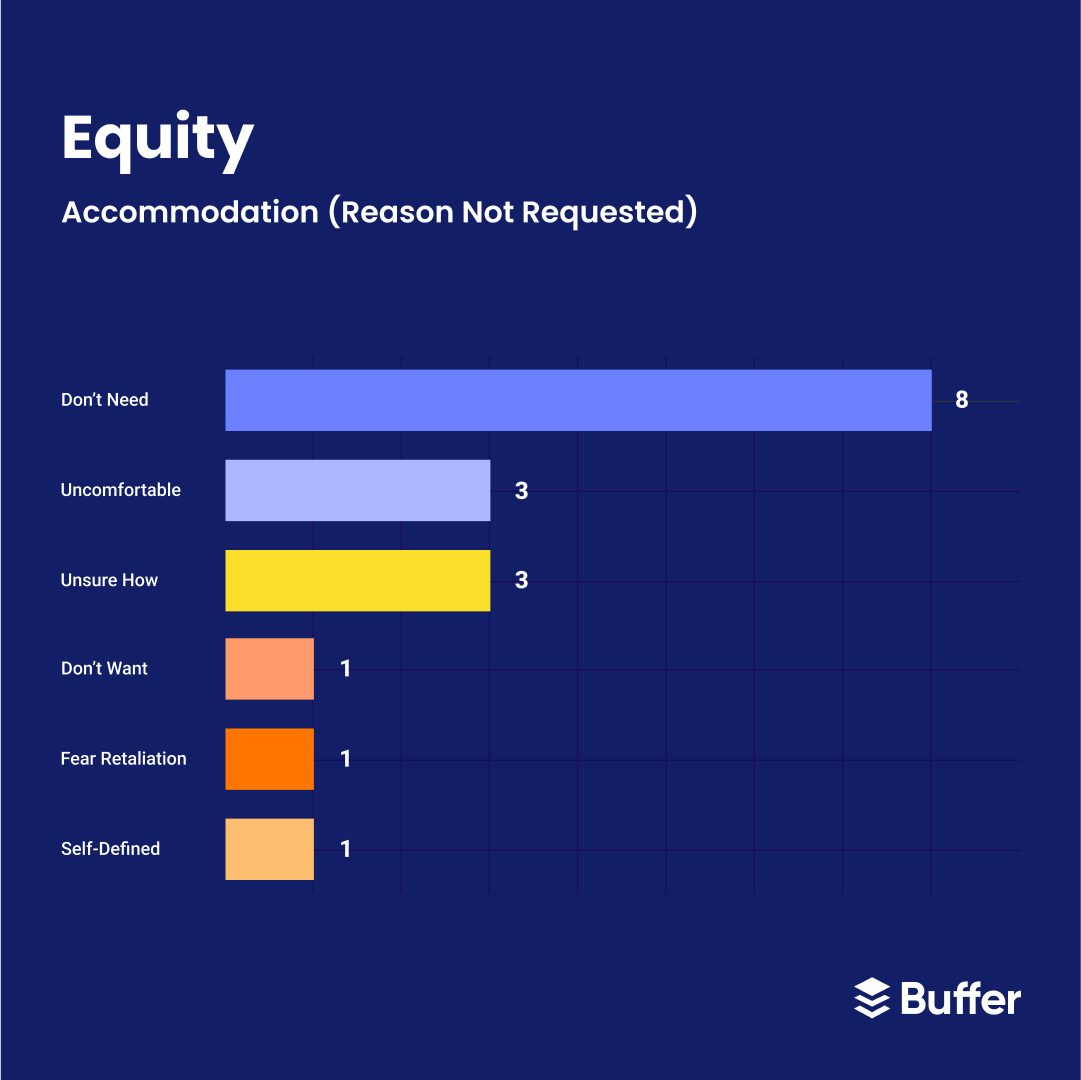
➡️ You can view our survey results directly in the Pluto dashboard here.
What we’re focusing on next
Using the results of our data, we created three main focal areas to guide our DEI Roadmap and prioritize our efforts. While there are many important areas of culture and DEI that we want to continually build upon, we decided to narrow our focus so we can have the most impact. As we move along our DEI journey, we can reevaluate what we focus on to determine if any adjustments need to be made.
- Uplift historically underrepresented groups within Buffer and the communities we impact, focusing on increasing Black representation where possible.
- Increase psychological safety so the team feels comfortable voicing contrary ideas or discussing DEI related topics.
- Center the experience of historically underrepresented teammates.
Our roadmap for 2022 and beyond
To support our goals, we have outlined initiatives and policies to help us move the needle, and expand upon our culture. Our roadmap is designed to support our three main focal areas, however we also want to remain flexible based on the needs of the team and any reactive work that might pop up throughout the year, so we intend to iterate often and be willing to pivot as needed. Since we are just getting started in our DEI journey, we want to remain open to learning along the way!
1. Uplift historically underrepresented groups within Buffer and the communities we impact, focusing on increasing Black representation where possible.
At Buffer, we strive to be a profitable company, and we haven’t taken Venture Capital money in eight years. Because of this, we grow our team gradually and don’t hire often, which means the hires we do make are incredibly important, and can have a large impact on the success of our company, as well as our representation goals. Therefore, we want to ensure our hiring experience is equitable and efficient for every open role.
When we are not actively hiring, we want to make sure we are positively impacting our internal team, and our external communities. This means we will prioritize team training and education opportunities on topics such as bias, anti-racism, and interviewing best practices, as well as work to nurture identity centered community groups, and highlight Black-owned customers. (Are you a Buffer customer and have a Black-owned business? Reach out on Twitter to let us know!)
2. Increase psychological safety so the team feels comfortable voicing contrary ideas or discussing DEI related topics.
Psychological safety has been proven to be a vital aspect of high performing teams, and helps maximize the benefits of diversity because it makes inclusion possible. In a psychologically safe environment, team members are able to ask questions, discuss thoughts and feelings regarding work and related projects, and acknowledge limitations in what they know or understand. Psychological safety helps create an inclusive environment where historically underrepresented teammates can succeed. Without inclusion, it isn’t possible to attract and retain talent.
To help increase our comfort in discussing potentially challenging topics, we plan to provide educational opportunities around engaging in uncomfortable conversations, skills for healthy debates and inclusive management. We want to support one another in sharing alternative perspectives so all voices can be heard, and we can better identify potential risks and challenges in our decisions.
Additionally, we plan to examine and evolve the systems and processes that support our team to improve clarity, reduce the opportunity for bias, and increase alignment, making adjustments and iterating where needed. This includes looking at structures such as incident reporting, accommodation requests, performance review processes, career frameworks, and termination processes to help mitigate uncertainty and anxiety, creating a container for candor.
3. Center the experience of historically underrepresented teammates.
Centering the experience of historically underrepresented groups brings our goals full circle, providing a way for teammates to participate fully in our culture and company. To do this, we plan to foster Employee Resource Groups (ERGs) and create a DEI Council, which have been shown to identify and develop internal leaders, increase retention rates, increase professional success of members, support recruitment efforts of underrepresented talent, and nurture talent pipelines. They promote team engagement and strengthen connection both internally and externally within the communities we impact. It allows us to tap into the immense benefit of diverse perspectives, supporting our overall ability to do well as a company.
Systemic changes are needed to create equity - not only for teams, businesses and corporations, but for the societies and countries we live in. Every step we can take towards growing and improving where we can, is a vibration that can reverberate out into the world we interact with. - Katie Gilmur, DEI Manager at Buffer
While none of these initiatives are quick fixes, and there is no one-size-fits-all approach with DEI, we are committed to creating a better world both inside and outside of Buffer. Systemic changes are needed to create equity - not only for teams, businesses and corporations, but for the societies and countries we live in. Every step we can take towards growing and improving where we can, is a vibration that can reverberate out into the world we interact with.
Since we are just getting started in our DEI journey, we’d love to learn from you! What DEI initiatives have worked well for you? What else can we share about how we’re approaching DEI at Buffer? Send us a tweet to let us know!
Try Buffer for free
190,000+ creators, small businesses, and marketers use Buffer to grow their audiences every month.




